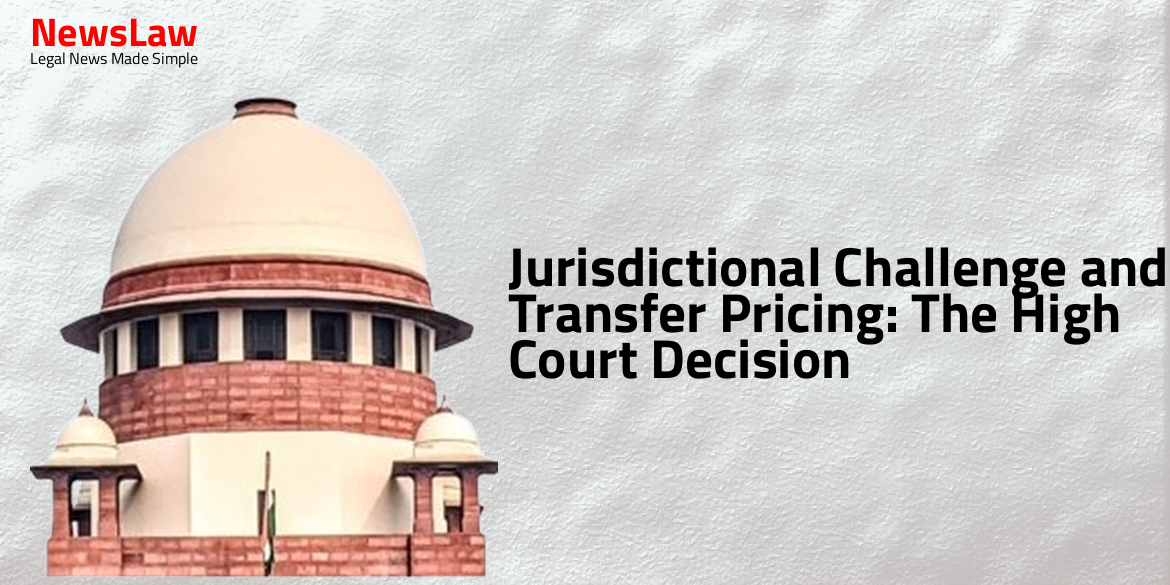In a significant legal ruling, the High Court addressed jurisdictional challenges and transfer pricing issues, impacting the case involving assessments and orders under Section 92CA. The decision has far-reaching implications for parties involved in such disputes. Stay informed about the latest developments in this complex legal landscape.
Facts
- The petitioner contended that a jurisdictional challenge was raised by way of an objection under Section 144C of the Act on 30 March 2013 by the AO.
- The petitioner was denied the benefit of working capital benefit considering the adjustment.
- Objections were raised before the Dispute Resolution Panel but not considered by the DRP.
- The contention of the assessee was regarding the price received being Rs. 74687177 instead of Rs. 75277881.
- Additions under Section 14A and Section 68 of the Act were set aside for fresh adjudication by the AO.
- Objections were filed before the DRP on 31 December 2013, specifically regarding transfer pricing adjustments.
- The transfer pricing adjustments were set aside and the matter remitted to the TPO for reconsideration.
- The ITAT observed specific details regarding the computation of arm’s length price for business support services.
- The Ld. AR argued that the question proposed for consideration and decision in the present appeal is not relevant.
- The Special Bench noted the submissions made by the Ld. AR at the outset of the hearing.
- The Ld. AR stated that the proposed question did not arise in the present appeal according to their interpretation.
Arguments
- Courts have observed distinctive features in assessments done under Section 144C of the Income Tax Act.
- Courts refrain from using their extraordinary jurisdiction due to the remedy available to the assessee.
- Referring to the case of Sabic India Private Limited vs Union of India and Ors, it was noted that the Income-tax Appellate Tribunal remanded proceedings for a fresh decision to the Assessing Officer/Transfer Pricing Officer/Dispute Resolution Panel.
- Section 153(4) of the Act may also apply in cases where the ITAT references the TPO.
- The Karnataka High Court judgment in TE Connectivity India Pvt. Ltd. vs Deputy Commissioner of Income was cited, emphasizing that the TPO should be given an opportunity to examine and grant working capital adjustments if found compliant with the law.
- Mr. Hossain raised a preliminary objection against entertaining the writ petition against the directions of the DRP.
- The question of whether giving a corporate guarantee is an international transaction was deemed irrelevant.
- The Special Bench directed the appeal to be placed before the appropriate Bench of the ITAT for disposal.
- The TPO’s jurisdiction was questioned for making a reference on 27 December 2018, deemed mala fide.
- Mr. Jolly argued that Section 153(3) of the Act governed the time frame for assessments and drafts.
- The reference by the AO on 27 December 2018 was condemned as an attempt to bypass limitations under the Act.
- Mr. Hossain maintained that a reference by the ITAT falls under Section 153(4) of the Act.
- The Special Bench’s decision on the guarantee issue was highlighted as a reason to contest the reference.
- Mr. Jolly argued against the applicability of Section 153(4) for references made by the AO.
- The validity of notices issued by the AO and TPO in 2017 was questioned in light of subsequent references.
- The extended period of twelve months under Section 153(4) was argued not to apply due to an illegal reference by the AO.
- The TPO’s actions post the reference on 17 October 2017 were deemed arbitrary and illegal.
- The adjudication of objections by the DRP was stated as a step in aid of assessment for eligible assessees.
- The Jr. Hossain suggested that the amendments in Section 153 of the Act post April 2022 clarifies the TPO’s duties.
- Mr. Jolly argued against the deemed reference concept citing significant amendments to Section 153 of the Act.
- The second reference by the AO on 27 December 2018 was deemed unnecessary after the ITAT remitted issues to the TPO.
- Mr. Jolly contested the TPO’s assumption of jurisdiction post the ITAT remand on the grounds of limitation.
- The ITAT’s authority to remit matters to the TPO and the respondents’ lack of challenge to the remanded issues were discussed.
- The TPO’s actions on 17 October 2017 without a formal reference by the AO were questioned for lack of authority.
- The power of the ITAT to remit matters to the TPO was defended by Mr. Jolly against the respondents’ challenge.
- The TPO’s transfer pricing study in absence of a reference by the AO was deemed unauthorized.
Analysis
- The analysis revolves around the statutory provisions under Section 153 of the Income Tax Act, particularly in relation to assessments and orders under Section 92CA.
- The discussion highlights the authority of the Income Tax Appellate Tribunal (ITAT) to remit a matter directly to the Transfer Pricing Officer (TPO) for determination of Arm’s Length Price (ALP) in international transactions.
- Reference is made to relevant provisions of law post amendments introduced by Finance Acts, 2014, 2016, and 2022 regarding the time frames for assessments, remands, and extended periods of limitation.
- The analysis emphasizes the ITAT’s jurisdiction to make direct references to the TPO and the challenges raised regarding jurisdictional errors and limits of the DRP’s authority.
- The discussion also touches upon specific cases such as S.G. Asia Holdings, emphasizing the importance of proper procedure adherence in assessment proceedings.
- The analysis concludes by underscoring the significance of statutory provisions, factual evaluations, and the ITAT’s role in remitting matters for appropriate adjudication.
- Section 92CA(1) of the Act mandates the Assessing Officer to refer international transactions or specified domestic transactions to the Transfer Pricing Officer for the determination of Arm’s Length Price (ALP).
- The Transfer Pricing Officer (TPO) is required to notify the assessee and proceed with determining the ALP for the relevant transactions.
- The TPO can also consider any international transaction not disclosed by the assessee in the report under Section 92E, as per Section 92CA(2B).
- Once the ALP is determined by the TPO, the Assessing Officer must compute the total income of the assessee in line with the determined ALP.
- Section 92CA(1) allows only the Assessing Officer to make a reference to the TPO.
- There are restrictions under Section 92CA(2C) on empowering the Assessing Officer to assess or reassess for any assessment year completed before July 1, 2012.
- The TPO must consider evidence produced by the assessee, information from Section 92D, and other relevant materials before determining the ALP.
- Statutory authority must exercise jurisdiction within the four corners of the statute.
- Any action taken outside the authority’s domain would be illegal and without jurisdiction.
- Rent Controllers must act within the four corners of the statute and exercise only vested powers.
- Rent Controller, being a creature of statute, must act within statutory confines.
- Tribunals like DRT have no inherent power existing in civil courts; they are creatures of the statute.
- Section 153(4) of the Act implies the claim is not time-barred in December 2019.
- ITAT held reference to TPO as an administrative issue that could not cure AO’s lapse.
- Supreme Court upheld ITAT’s view that not making reference to TPO breached CBDT instructions.
- Judgment affirmed Tribunal’s conclusion on the breach of mandatory CBDT instructions.
- Mr. Hossain’s contention could not be sustained.
- The judgment in TE Connectivity was focused on the Assessing Officer/Transfer Pricing Officer/Dispute Resolution Panel.
- The High Court ruled in favor of the assessee in that case.
- No observations or conclusions in the TE Connectivity case supported the respondents’ submissions in the current proceeding.
- The writ petition was refused, and the second respondent was barred from passing further orders of final assessment for AY 2009-10.
- The petitioner is entitled to all consequential reliefs.
Decision
- The appeal has been allowed to a certain extent.
- No costs are to be incurred.
- The Petitioner has the right to bring up all pleas regarding the case’s merits, including those previously mentioned, when using its statutory remedy.
- The Petitioner can exercise its rights under Section 144C(5).
Case Title: NEW DELHI TELEVISION LIMITED Vs. DISPUTE RESOLUTION PANEL 2 & ANR. (2024:DHC:4052-DB)
Case Number: W.P.(C)-2322/2021



